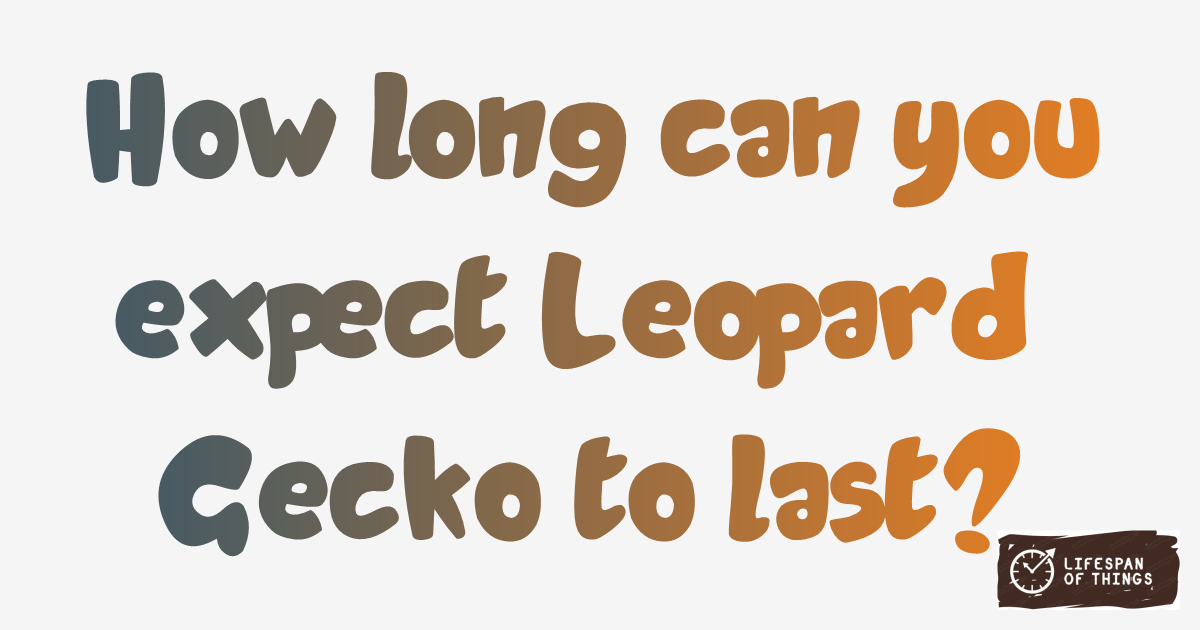
10 - 20 Years
Lifespan of Leopard Gecko is 10 - 20 Years. Leopard Geckos have a lifespan of 10-20 years. Factors influencing their lifespan include proper diet, habitat conditions, and preventive healthcare routines. Providing a balanced diet, suitable environment, and regular vet checkups can help improve their longevity.
Useful Information
Leopard Geckos thrive in warm, arid environments with hiding spots and climbing areas. A proper terrarium setup with a heating pad, UVB light, and substrate like reptile carpet or paper towels is essential. Maintaining temperature and humidity levels within the ideal range is crucial for their well-being.
Leopard Geckos are insectivores and eat a diet of live insects like crickets, mealworms, and Dubia roaches. Gut-loading insects with nutritious supplements before feeding them to your gecko ensures they receive essential nutrients. Providing a shallow water dish for hydration and calcium supplements for bone health is also recommended.
To care for Leopard Geckos, regular cleaning of their enclosure, monitoring temperature gradients, and providing a calcium supplement are important. Handling them gently and avoiding sudden movements can reduce stress. Preventing common health issues like metabolic bone disease and shedding complications through proper husbandry practices can contribute to their longevity.
Learn why regular health checkups are essential for the longevity of lizards and how to create a stress-free environment to promote their well-being. Read more
Leopard Geckos are known for their docile nature but may exhibit territorial behavior with other geckos. Handling them with care and slowly acclimating them to human interaction can help build trust. Training techniques involve positive reinforcement, such as offering treats for desired behaviors. Creating a routine and establishing a comfortable handling process can help manage their behavior.
Leopard Geckos are not endangered in the wild, but habitat destruction and illegal pet trade pose threats to their populations. Conservation efforts focus on preserving their natural habitats and raising awareness about responsible pet ownership. Supporting ethical breeding practices and avoiding wild-caught specimens can help protect these fascinating reptiles.
Lifespan Comparisons
| Compared Item | Comparison Description |
|---|---|
| Lifespan of Reptiles and Amphibians | Leopard Geckos typically live as long as Reptiles and Amphibians, which have a lifespan of 10-15 years. |
| Lifespan of Cats | Comparing to Cats, Leopard Geckos have a similar lifespan range of 10-15 years. |
| Lifespan of Dogs | In contrast to Dogs, Leopard Geckos also live around 10-15 years on average. |
| Lifespan of Rabbits | Unlike Rabbits with a lifespan of 6-12 years, Leopard Geckos live longer within 10-20 years. |
| Lifespan of Green Iguana | Green Iguanas are known to live at least 5 years longer than Leopard Geckos on average. |
| Lifespan of Bearded Dragon | Bearded Dragons have a slightly shorter lifespan of 8-12 years compared to Leopard Geckos. |
| Lifespan of Chameleon | Chameleons typically live 5-10 years, shorter than Leopard Geckos' lifespan range. |
| Lifespan of Toyota Camry | Toyota Camry cars can last as long as Leopard Geckos, with a lifespan of 20-30 years. |
| Lifespan of Honda Accord | Honda Accords have a lifespan similar to Leopard Geckos, around 10-15 years. |
| Lifespan of Hyundai Sonata | Hyundai Sonatas live slightly longer than Leopard Geckos, with a lifespan of 15-20 years. |
| Lifespan of Nissan Altima | Nissan Altimas also have a lifespan range of 15-20 years, like Leopard Geckos. |
| Lifespan of Kia K5 | Compared to Kia K5 cars, Leopard Geckos generally live 5-15 years longer. |
| Lifespan of Toyota RAV4 | Toyota RAV4's average lifespan falls within the range of Leopard Geckos, around 10-15 years. |
| Lifespan of Honda CR-V | Honda CR-V cars typically outlast Leopard Geckos, with a lifespan of 12-15 years. |
Frequently Asked Questions
Lifespan of Leopard Gecko is 10 - 20 Years.
Leopard Geckos thrive in warm, arid environments with hiding spots and climbing areas. Make sure to provide a terrarium with a heating pad, UVB light, and suitable substrate.
Leopard Geckos are insectivores and eat live insects like crickets, mealworms, and Dubia roaches. Ensure to gut-load insects for optimal nutrition.
Regular cleaning, monitoring temperature gradients, and providing calcium supplements are essential for preventing common health issues in Leopard Geckos.
Leopard Geckos are not endangered in the wild, but habitat destruction and illegal pet trade pose threats to their populations. Conservation efforts are crucial to protect them.








